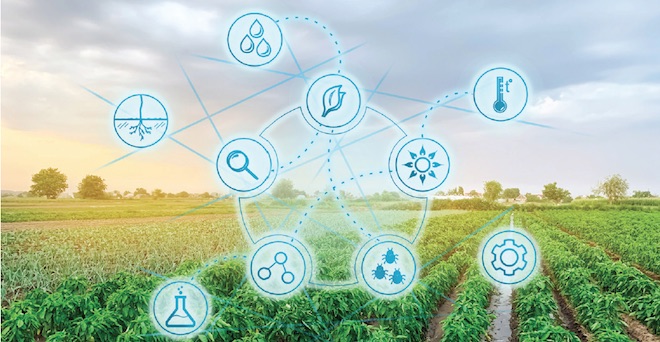

Nov 10, 2021Expert cites anti-disease properties of peptides for use in specialty crops
Naturally occurring peptides, the building blocks of plant and animal proteins, show some effectiveness for fighting plant disease in specialty crops.
So says Mauricio Flores, an international consultant who spoke Sept. 1 at the Peptides and Citrus Disease Management Symposium in Bowling Green, Florida.
Flores, who holds a master’s degree in virology from the University of Costa Rica, works as a private consultant specializing in plant disease management for citrus, coffee, melons and vegetables throughout Central America, Mexico and the U.S. His expertise is in diagnosing problems and then developing integrated solutions with chemicals, biologicals, plant resistance responses and specific nutritional aspects that can help overcome disease.
To learn more about this new type of agricultural resource, Vegetable Growers News caught up to Flores after his presentation in Florida for a question and answer session.
Vegetable Growers News: First of all, can you just break it down in layman’s terms? What is a peptide? Where do they come from, and how are they used in specialty crops agriculture?


Mauricio Flores: A peptide is a small molecule made of amino acids, basically not more than 50 amino acids in the chain.
If the molecule has more than 50 amino acids, it is cataloged as a protein. We call them peptides also because the chemical bonds that make up the molecule are called peptide bonds (an amino group plus a carboxyl group).
We have many peptides produced in nature, such as plant peptides, fungal peptides, anticancer peptides, bacterial peptides, brain peptides, gastrointestinal peptides just to mention a few. They have been categorized based on their source and function.
The concept in plants is rather new, and we call them AMPs (antimicrobial peptides). Right now, they are being used in different crops such as citrus, ornamentals, coffee, melons, tobacco, tomatoes, peppers, cucumbers, macadamia, almonds, etc. in order to control fungal, bacterial and viral disturbances.
They are included in the spraying programs against pathogens.
VGN: What’s your own experience with peptides, and how did you come to work in this very specific area of agriculture and biological chemistry?
MF: I started noticing that a product called Keyplex I was using against viruses in ornamentals was generating an overwhelming remission of symptoms with this specific disturbance, and helping against funguses and bacterias as well.
Basically, the product was supposed to only activate the natural resistance in the plant, but it also behaved as a fungicide, bactericide and viricide.
I started investigating what could be causing such a control in the field of several viral, fungal and bacterial diseases in different crops, and performed in vitro testing of the product.
The in vitro testing validated that the product inhibited the growth of funguses such as Colletotrichum acutatum, Alternaria alternata, Fusarium oxysporum, Glomerella cingulata just to mention a few, and also against Xanthomonas citri, Pseudomonas corrugata, Erwinia amylovora, which are bacterial pathogens in plants.
The conclusion was that the product had peptides that inhibited the growth of all these pathogens.
VGN: If I remember my high school chemistry correctly, the definition of a protein is a polypeptide chain of amino acids. Would it be accurate to say they’re a building block of proteins, helping plants to grow?
MF: Yes, indeed, that is a good definition (but not more than 50 in the chain), and yes amino acids are the building blocks of proteins, although our main approach is to use them against plant disease.
VGN: I came across one researcher with a USDA grant looking at peptides for supporting the salmon industry. Are there uses for peptides outside of specialty crops and row crops?
MF: I believe that the potential for this kind of product is enormous not only in the agricultural business, but also in clinical trials against antibiotic-resistant bacterias since the mode of action of the peptide does not generate resistance in time.
VGN: Would you say that most peptides used in agriculture would be naturally occurring?
MF: Yes. They would have to be produced from natural sources, say a fungal strain for instance.
VGN: Give an example of how a company would identify a peptide as being useful and then isolate it and produce it at scale for agricultural use.
MF: First the natural organism (candidate) has to provide the AMP. Then in vitro studies would have to be performed against diseases in order to see if the potential AMP is really generating lysis of the pathogen. (Lysis is the breakdown of a cell by damaging its membrane.)
The company needs to investigate thoroughly if the organism really produces AMPs by using special chromatographic techniques in order to see if the peptide or peptides are present. After this procedure is performed, you need to sequence each one of them in order to have the whole picture.
Field trials in different crops is highly recommended, finally validating the results with statistical and scientific rigor.
VGN: In your mind, what are the top two or three most promising fields for peptide-based products for fruit and vegetable growers?
MF: Basically, focusing on the peptides for disease control. Nowadays the necessity for new alternatives in agriculture for disease control is a major issue due to the concept of the imperative need for fewer chemical residues in vegetables, fruits, overall agricultural products, and also fewer residues in the soil in order to take care of our water sources.
Peptides offer a great chance of avoiding resistance due to the mode of action, which is directed to the cell membrane and enzymes of the pathogen. Due to this characteristic, we can have an important tool to control disease for a long time in a natural way.
Also, sometimes the chemical control is either non-effective or leaves too many chemical residues. With peptides, we can help control disease in tough situations (like Citrus huanglongbing, aka citrus greening, for example) and have a new alternative going in different crops.
— Stephen Kloosterman, associate editor














